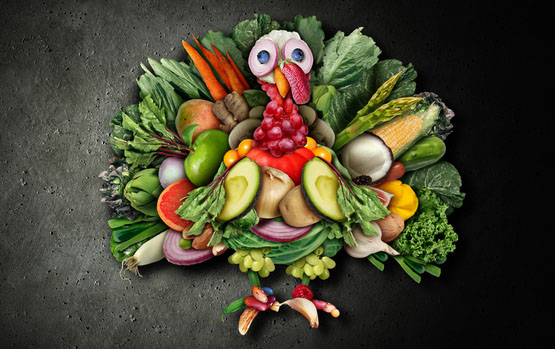During fall outings to farms and pumpkin patches, your child may have put two and two together and discovered that those charming pigs, chickens, and GASP! TURKEYS! will eventually make their way to your family’s dinner table.
And they are absolutely horrified. Your child passionately announces that, from this moment forward, they will only eat vegetables – and they are skipping that Thanksgiving main course entirely. While the passion and the goal behind this change in lifestyle may be admirable, when your household is not vegetarian or vegan, the person who preps, cooks, and serves your child’s meals can be at a loss as to how to proceed.
Alzein Pediatrics is here to help you navigate. While it might be difficult at first, stay positive and supportive of your child’s decision. Your child is discovering what is important to them, establishing independence, and working to make a positive effect on the world. How wonderful is that!
How to support your child’s journey to vegetarianism
Make sure your child knows the difference between becoming a vegetarian and being a vegan. Both are more than diets – they are lifestyles. True vegetarians and vegans also do not use any items that were made using animals, such as leather belts or shoes. Vegans do not use or wear any animal-byproducts, such as wool.
From a dietary standpoint, both diets allow fruits, vegetables, grains, and plant-based protein. The difference lies in what is not allowed:
• Vegetarian diet excludes meat, but allows animal byproducts, such as milk, cheeses and eggs, where no harm comes to the animal.
• Vegan diet excludes any meat and also excludes animal byproducts. Vegans do not eat any product that uses milk, dairy or eggs. Vegans also do not eat Jell-O or marshmallows as they are made with gelatin, an animal by-product.
Set clear expectations
First, research with your child how these dietary changes will change their everyday lifestyle. Explore recipes and plan together how your child will get proper nutrition with this new lifestyle. Explain very clearly that eating grilled cheese sandwiches three times every day will not give them the nutrients they need; eating a proper diet, full of vitamins and mineral, will be necessary to continue on this path.
Start slowly
Encourage your child to start step by step. Drastic, hurried diet changes usually fail. Families will need time to prepare, especially if everyone is converting their diet.
One option is to try “meatless Mondays” for a month. This gives cooks time to find easy to prepare, enjoyable meals. Add an additional “meatless” day every month, until you’ve fully transitioned within 7 months.
An alternative method is to give up one animal-based protein every month. Start with a meat that isn’t consumed often in your house, which should be easy to avoid completely. After a month, remove another meat or animal-based protein. Eventually, you will have eliminated animal-based products from your diet.
Is this really a healthy lifestyle?
Yes! You, your child and your family can get all the protein, calcium, iron and more needed to stay healthy on a vegetarian or vegan diet. This can easily be accomplished by eating a variety of foods:
Protein: Beans, lentils, tofu, nuts, seeds, peas
Iron: Spinach, chard, cashews. Citrus fruits and juices also help the body absorb more iron
Calcium: Broccoli, Collard Greens, Kale
B12: The vitamin B12 is important for nerve health. Although adults and children need only a small amount daily, going without can cause damage to your health, such as macular degeneration. Make sure you are consuming foods that are fortified with vitamin B12 or are taking a non-animal-derived vitamin supplement.
As you reduce your consumption of animal-based foods, your family may actually enjoy the process and notice an improvement in everyone’s health. Research show that vegetarians are 25% less likely to die of heart disease and that, when done correctly, a vegetarian diet lowers the risk of diabetes, high cholesterol, and cancer.
If your child decides they cannot convert wholly to a vegetarian diet, that’s okay too. Reducing animal consumption by any amount has tremendous health benefits.
When your child wants to go meatless and you want to ensure they are getting all the nutrients growing children need, just message us through your patient portal. Alzein Pediatrics is always here to help.


